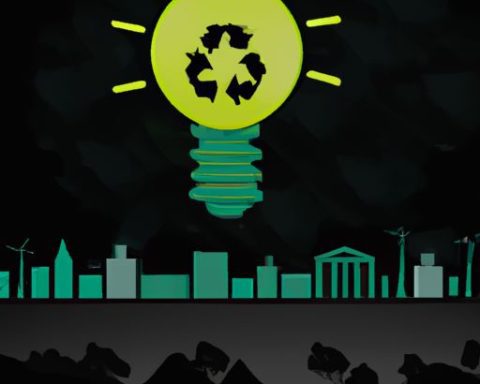Funding remains a challenge for South Africa’s fight against climate change, despite having strong policies in place. Mr. Cedric Frolick highlights the importance of blended finance in achieving the country’s low-carbon economy goals. The Just Energy Transition Implementation Plan requires retraining the workforce to counter potential job cuts. Cross-border collaboration and transparency are also key factors in achieving a sustainable future. The parliament must ensure the equitable distribution of benefits during this period of transition.
What is South Africa’s approach to climate finance?
South Africa has implemented strong policies to fight climate change, but funding remains a challenge. Cedric Frolick, South Africa’s lead player in the global climate change battle, highlights the importance of blended finance in achieving the country’s low-carbon economy goals. The Just Energy Transition Implementation Plan, South Africa’s main strategy against climate change, proposes a greener future but requires retraining the workforce to counter potential job cuts. Mr. Frolick believes parliamentarians must ensure the equitable distribution of benefits during this period of transition. Cross-border collaboration and transparency are also key factors in achieving a sustainable future.
In the vibrant center of Dubai, on a lively December day, the COP28 conference was abuzz with anticipation and resolve. One voice stood out amid the noise – that of Mr. Cedric Frolick, South Africa’s lead player in the worldwide battle against climate change. As a seasoned politician and parliament member, he emphasized the critical part that blended finance plays in South Africa’s pursuit of a low-carbon economy.
South Africa is proud of its strong policy arsenal created to fight climate change. However, the enduring obstacle continues to be funding. Mr. Frolick elaborates, “If we fail to fulfill our financial obligations for the Just Transition program, reaching our goals for 2030 and 2050 will be an uphill task.” Alarmingly, most of these commitments take the form of loans, casting shadows of future financial strain.
A mere 13% of the total needed, or $11 billion, has been collected, making Mr. Frolick’s blended finance appeal even more pressing. He emphasizes that blended finance is crucial for minimizing risk in climate change initiatives, drawing much-needed private investment to boost mitigation and adaptation measures.
The Just Energy Transition Implementation Plan
The crux of South Africa’s fight against climate change is the Just Energy Transition Implementation Plan. The plan bravely proposes a greener future, with the shutdown of six coal power stations by 2030, and an additional seven by 2050. This ambitious roadmap, however, is laden with hurdles such as potential job cuts and the risk of deserted towns.
The solution to counter these risks lies in retraining and enhancing the skills of the workforce, especially in mining towns. Mr. Frolick asserts, “We must get the basics right. If we maintain our current path without considering the people, they will not accept it.” His statement resonates with a deep comprehension of the importance of ensuring a fair and inclusive transition.
Mr. Frolick offers an insightful viewpoint on the parliament’s role during this sensitive transition period. It’s the duty of the parliamentarians to ensure that economic shifts caused by mitigation efforts don’t negatively impact workers and communities. He firmly believes in the importance of oversight to ensure well-managed, fair, and equitable climate change projects. The opportunities emerging from the transition should contribute to a positive and transformed economic landscape.
The Need for Oversight and Collaboration
Another aspect of the transition that demands strict parliamentary supervision is transparency. As Mr. Frolick aptly points out, it is crucial to maintain clear understanding of the climate finance available and its affordability.
Looking beyond domestic concerns, Mr. Frolick views the energy transition as a chance for increased cross-border cooperation within the Southern African Development Community. This could lead to an expansion of renewable energy production and distribution to countries with greater demand. Integrating the education sector could also cultivate the expertise needed to stimulate a greener economy.
In his concluding remarks, Mr. Frolick underscores the predicament faced by countries like South Africa. While reducing coal usage is a part of the just transition, it’s crucial to provide sufficient support to at-risk workers and communities before power stations are decommissioned.
Navigating Towards a Low-Carbon Economy
In summary, South Africa’s path to a low carbon economy is a delicate balancing act. It necessitates the harmonization of policies, financial strategies, and effective oversight. The goal is to achieve mitigation and adaptation without compromising social justice. As Mr. Frolick narrates, this journey, despite its challenges, is an essential step towards a sustainable future.
What is the Just Energy Transition Implementation Plan?
The Just Energy Transition Implementation Plan is South Africa’s main strategy against climate change. It proposes a greener future, with the shutdown of six coal power stations by 2030, and an additional seven by 2050. The plan requires retraining the workforce to counter potential job cuts and emphasizes the importance of oversight to ensure well-managed, fair, and equitable climate change projects.
What is blended finance, and why is it important?
Blended finance is a financial strategy that combines public and private funding to support sustainable development initiatives. It is crucial for minimizing risk in climate change initiatives and drawing much-needed private investment to boost mitigation and adaptation measures. Cedric Frolick highlights the importance of blended finance in achieving South Africa’s low-carbon economy goals.
What is the role of parliament in the energy transition?
The parliament must ensure the equitable distribution of benefits during this period of transition and ensure that economic shifts caused by mitigation efforts don’t negatively impact workers and communities. Oversight is crucial to ensure well-managed, fair, and equitable climate change projects.
Why is cross-border collaboration important in achieving a sustainable future?
Cross-border collaboration within the Southern African Development Community could lead to an expansion of renewable energy production and distribution to countries with greater demand. Integrating the education sector could also cultivate the expertise needed to stimulate a greener economy.
How can the transition to a low-carbon economy benefit workers and communities?
The opportunities emerging from the transition should contribute to a positive and transformed economic landscape. Retraining and enhancing the skills of the workforce, especially in mining towns, can counter potential job cuts. The parliament must ensure the equitable distribution of benefits during this period of transition.
What are the challenges facing South Africa in its fight against climate change?
Funding remains a challenge, with most commitments taking the form of loans casting shadows of future financial strain. The transition to a low-carbon economy is laden with hurdles such as potential job cuts and the risk of deserted towns. It is crucial to provide sufficient support to at-risk workers and communities before power stations are decommissioned.










